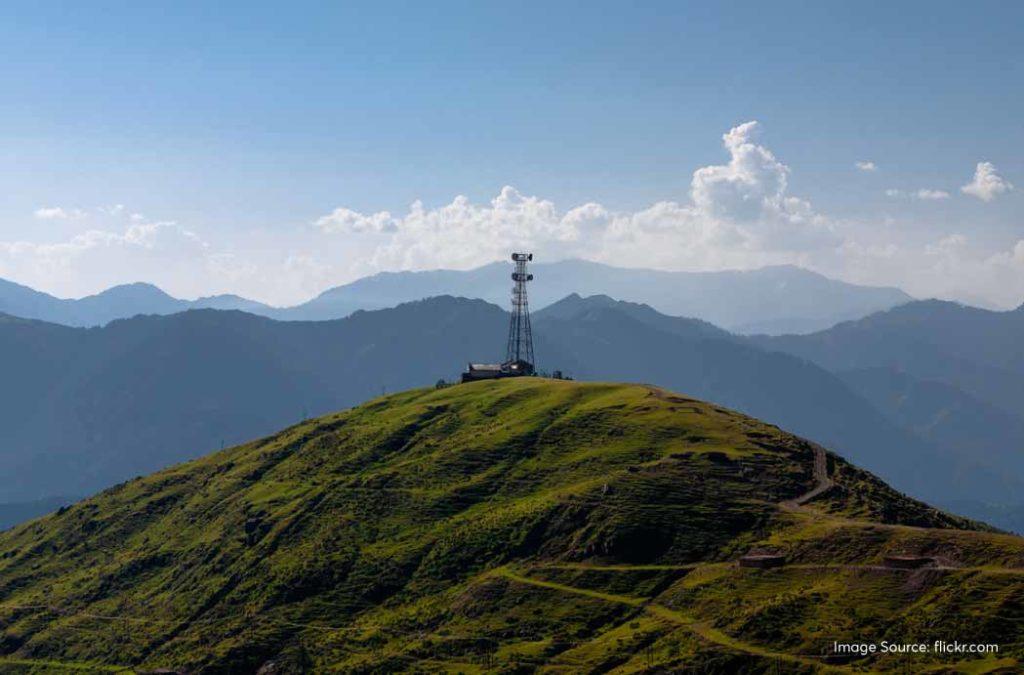Cannot visit Switzerland this year? India has its own! Kashmir is a heartwarming destination known to replicate the mystical beauty of Switzerland. Jammu and Kashmir is one of the serene states in India where apple orchards bloom in the snow. As you plan to explore the state, know that Kashmir is beyond the ordinary attractions. Take a wise decision and go to explore the best hill stations in Jammu and Kashmir.

Hill stations in Jammu and Kashmir boasts of unique flora and fauna. Along with the lovely locals and wooden homes, these hill stations call for adventure too! However, a lot remains unexplored about this state. So, check out this blog to explore the famous hill stations for a soothing journey. Also, do not miss out on the best hotel deals at Treebo hotels for a comfortable stay.
10 Awe-inspiring Hill Stations in Jammu and Kashmir are –
1. Aru Valley
Verdant landscapes below your foot and snowy peaks above your head, that’s what Aru Valley is known for! It is one of the heartwarming hill stations in Jammu and Kashmir for a scenic getaway. Aru Valley is located in the trans-Himalayan range.

The strategic positioning makes it ideal for a comfortable time. The place is straight out of a movie where actors dance in massive lands of green. Known for sprawling meadows, Aru remains untouched by heavy tourism. You can also witness small wooden houses where tiny settlements welcome you with joy.
If you are up for an adventure, Aru Valley is the best place to be! It is a base camp for trekking routes to the famous Kolahoi Glacier and Tarsar Lake. Some of the other adventure activities here include skiing, horse riding and heliskiing. It is ideal to stay with locals and indulge in photography.
2. Gulmarg
Nestled amidst the magic of nature, Gulmarg is one of the popular hill stations in Jammu and Kashmir. It is specifically known for its awe-inspiring mountains covered in snow during the winter months. If you are up for a thrilling time, Gulmarg is the place to be!

The hill station attracts thousands of tourists because of the traditional Gondola Ride. The gondola ride takes you through the soothing mountain peaks and allows you to witness the Apharwat peak too. Its strategic location allows you to indulge in horse riding, trekking and other snow adventures.
Gulmarg blooms with vibrant flowers during the summer season making it one of the best times to travel. You can also experience the true essence of Kashmiri culture with happy locals around. Not to forget that Gulmarg has amazing spots to captivate Instagram-worthy pictures.
A Tapestry of Heritage and Nature: 9 Unmissable Places to Visit in Jammu
3. Kishtwar
Hop on the land of the unknown as Kishtwar remains one of the untouched hill stations in Jammu and Kashmir. Kishtwar is a hidden gem for nature lovers as the place is home to sprawling meadows. The hill stations offer panoramic views of snowy mountains and tiny settlements.

Kishtwar is not for the faint-hearted! You are talking about real adventure as the hill station offers the popular Kishtwar Kailash circuit trek. Rugged terrain and challenging slopes make it a spot for daredevils! Camping is also a famous activity available for tourists throughout the region.
If you are looking for a rejuvenating yet homely time, Kishtwar has to be your go-to destination. It is one of the offbeat hill stations in Jammu and Kashmir with less commercialization. Book your accommodation in a homestay and experience the cultural practices of the residents.
4. Dah and Hanu
A few surreal hill stations in Jammu and Kashmir are all about a fusion of experiences. Dah and Hanu are small villages located in the heart of the state. The hill stations receive love and fame due to the existence of the Brokpa or Drokpa community.

If you are seeking a distinctive experience and want to explore the cultural patterns, Dah and Hanu are perfect! The Drokpa community is known for its unique clothing, age-old customers and vibrant lifestyle. You can be a part of cultural workshops, observe the Brokpa homes or explore the local markets.
Overlooking the Indus River and Himalayan mountains, Dah and Hanu are jaw-dropping attractions in the state. It is best to visit this hill station during festivals as the locals gear up for celebrations! Do not forget to try their local cuisine and respect their norms.
A Slice of Mountain Paradise: 15 Most Intriguing Things to Do in Jammu
5. Srinagar
Srinagar is indeed the hot spot for travellers across the globe. It is one of the most loved hill stations in Jammu and Kashmir. Known as the Summer Capital of the state, Srinagar is best known for its iconic Dal Lake. You can get on to one of the Shikharas (boats) and enjoy the mesmerising views.

The Dal Lake allows you to explore floating markets where shopping and negotiating are a thing! Being one of the crowded hill stations in Jammu and Kashmir, you can still find tranquil Mughal parks. After you complete doing the touristy things, exploring Jamia Masjid and Hazratbal Shrine is a must. Trekking and camping are top-rated things to do for adventure enthusiasts.
You can easily stay in a houseboat defining the architectural beauty of Kashmiri aesthetics and construction. The hill station of Srinagar truly invites you to infuse in the flavours of Kahwa tea, Rogan Josh and scrumptious kebabs. Since it is well commercialised, you can find everything in the stores around.
6. Patnitop
Who does not long for a rejuvenating getaway amidst the hills? Patnitop is one of the serene hill stations in Jammu and Kashmir for the perfect holiday. Located in the Udhampur district, Patnitop is featured in thick pine forests. A nature walk with your loved ones in such a forest itself is so therapeutic!

The right season allows you to hold your breath as you jump off the hills for a stimulating paragliding adventure. Trekking and skiing are common activities to take in the essence of Patnitop. You can also opt for camping in certain locations.
It is one of the renowned hill stations in Jammu and Kashmir for the Nag Temple and Shiva Garh. Soak in the spiritual vibes only to get back to serenity with soothing drives. Not to forget try special kaladi (a local cheese) and Rajma chawal on the days of a cool breeze.
Kashmir Itinerary: 15 Places to Make Your Trip the Best Ever!
7. Sonamarg
How can you ever complete your holidays without visiting Sonamarg?! Sonamarg is one of the most beautiful hill stations in Jammu and Kashmir. Wrapped in the blanket of nature, the hill station is known as the Meadow of Gold. Whether you are looking for a relaxing getaway or wish to experience Kashmiri hospitality, Sonamarg has it all.

The hill station is home to a plethora of alpine meadows giving you Instagram-worthy backdrops. The serenity of Sonamarg elevates with the presence of Thajiwas Glacier. A trekking expedition to the glacier is one for the brave-hearted. You can also opt for pony rides and skiing. For the thrill seekers in you, white water rafting is available in the Sindh River during summer.
Is that all? Surely not! The Sindh River offers scenic nature walks with your loved ones. Zoji La Pass is yet another famous mountain pass for a stunning expedition. Sample the traditional food including Kashmiri Pulao, Kebabs and Dum Aloo. The hill station also offers authentic shopping experiences.
8. Yusmarg
You are now entering a pristine landscape of the state. Yusmarg is one of the picturesque hill stations in Jammu and Kashmir. Located in the Budgam district, Yusmarg is known for the panoramic views of alpine meadows. Snow-capped mountains and forests make it a winter wonderland!

Yusmarg is home to the Doodh-Ganga River where you can take a stroll with your loved one. A romantic getaway elevates with crystal clear waters making it so enchanting! Sang-e-Safed Valley is known for its divine landscapes and rugged valley views.
Charar-e-Sharief is a divine shrine known for its peaceful ambience. Tranquil green surroundings and pine trees offer a serene picnic experience. It is best to plan a relaxing day out across the river. Also, do not forget to explore the diverse flora and fauna with guided tours.
Experience Snowfall in Kashmir – Admire the White Draping of the Hills in the Valley
9. Pahalgam
The alluring beauty of Pahalgam transcends with the presence of quaint hills. Nestled in the heart of Anantnag district, it is one of the best hill stations in Jammu and Kashmir. Pahalgam is known for its iconic Betaab Lake which was once featured in a Bollywood movie.

Pahalgam also serves as the base point for the popular Amarnath pilgrimage. The hill station receives much love from travellers throughout the year. It is best to book hotels in Jammu and Kashmir well in advance to better enjoy your holidays. Scenic vistas are ideal for photography enthusiasts.
If you are looking for unique activities, Pahalgam Golf Course welcomes you! Another popular activity is white water rafting in the Lidder River. As you crash through the strong waves, know that you are making each moment count. Take pictures in the backdrop of meandering streams and diverse landscapes.
10. Sanasar
Sanasar is one of the idyllic hill stations in Jammu and Kashmir known for its unspoiled beauty. Located close to Patnitop, Sanasar is a more secluded place in the state. You can roll in the verdant meadows or take a stroll across the tranquil lakes.

Sanasar is a perfect spot for adventure seekers as the place is perfect for paragliding. Heavy winds make it an amazing experience to witness the mountains from the top. Along with this, you can also opt for hiking and go through the tricky trails of Sanasar.
Since it is a quaint hill station, it is a great opportunity to witness the local customs and traditions here. Be a part of local festivals and interact with locals. Also, try their home-cooked to add the Kashmiri touch to your journey!
Hill stations in Jammu and Kashmir are tucked away from the everyday chaos. As you step into the tranquil aura, you are certain to feel joyful! With the best accommodation options, you can satisfy your thirst for wanderlust.







